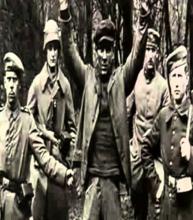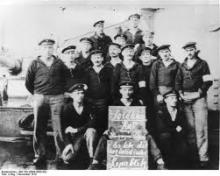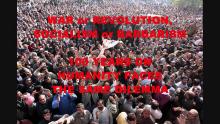Submitted by International Review on
The Great War 1914 - 2014
Friedrich Engels once said: “Bourgeois society stands at the crossroads, either transition to socialism or regression into barbarism.” What does “regression into barbarism” mean to our lofty European civilization? Until now, we have all probably read and repeated these words thoughtlessly, without suspecting their fearsome seriousness. A look around us at this moment shows what the regression of bourgeois society into barbarism means. This world war is a regression into barbarism. The triumph of imperialism leads to the annihilation of civilization. At first, this happens sporadically for the duration of a modern war, but then when the period of unlimited wars begins it progresses toward its inevitable consequences. Today, we face the choice exactly as Friedrich Engels foresaw it a generation ago: either the triumph of imperialism and the collapse of all civilization as in ancient Rome, depopulation, desolation, degeneration – a great cemetery.
1914: how the bloodletting began
Submitted by International Review on
Jean Jaurès: a giant of the workers' movement
Submitted by International Review on
1914: How the 2nd International failed
Submitted by International Review on
How the 2nd International failed the workers in 1914
Submitted by ICConline on
1914: The Socialists Betray Socialism
Submitted by ICConline on
1914: how German socialism came to betray the workers
Submitted by International Review on
1914: Labour and the unions mobilise the workers for war
Submitted by World Revolution on
The birth of totalitarian democracy
Submitted by International Review on
The film "Merry Christmas" and the real story of the 1914 Christmas Truce
Submitted by ICConline on
Zimmerwald and the centrist currents in the political organisations of the proletariat
Submitted by International Review on
How the working class brought an end to World War I
Submitted by ICConline on
1914 ‘commemoration’: Right and left justify imperialist war
Submitted by ICConline on






 In the 200,000 years of its existence, the human species has made astonishing strides in its productive capacity, its technique, its mastery of the laws of nature, and its culture. In the 10,000 years between the Neolithic Revolution and the present day, the pace of its progress has quickened. Yet humanity's progress has never been a smooth and peacful process; on the contrary, each step forward has been achieved through the clash of opposing classes, opposing class interests. Opening up a new perspective has never been possible without the revolutionary overthrow of the old order and the old classes which block the path the the future.
In the 200,000 years of its existence, the human species has made astonishing strides in its productive capacity, its technique, its mastery of the laws of nature, and its culture. In the 10,000 years between the Neolithic Revolution and the present day, the pace of its progress has quickened. Yet humanity's progress has never been a smooth and peacful process; on the contrary, each step forward has been achieved through the clash of opposing classes, opposing class interests. Opening up a new perspective has never been possible without the revolutionary overthrow of the old order and the old classes which block the path the the future. 100 years ago, humanity stood on the brink of the abyss, about to plunge into the most terrible bloodletting ever seen in history. For generations after the Great War, 1914-18 was synonymous with senseless murder, a ghastly waste of life in the horror of the trenches, for which the suffering populations rendered the governments and the ruling classes largely responsible. To commemorate the war, one hundred years on, is thus something of an embarassment for those same ruling classes, and so 2014 became a year, not of commemoration but of forgetting.
100 years ago, humanity stood on the brink of the abyss, about to plunge into the most terrible bloodletting ever seen in history. For generations after the Great War, 1914-18 was synonymous with senseless murder, a ghastly waste of life in the horror of the trenches, for which the suffering populations rendered the governments and the ruling classes largely responsible. To commemorate the war, one hundred years on, is thus something of an embarassment for those same ruling classes, and so 2014 became a year, not of commemoration but of forgetting.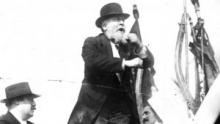
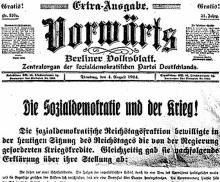
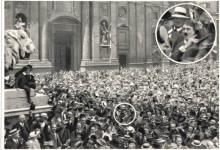

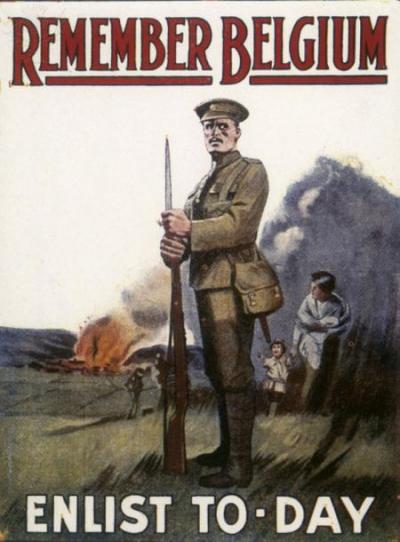 "The conscious and intelligent manipulation of the organised habits and opinions of the masses is an important element in democratic society. Those who manipulate this unseen mechanism of society constitute an invisible government which is the true ruling power of our country"
"The conscious and intelligent manipulation of the organised habits and opinions of the masses is an important element in democratic society. Those who manipulate this unseen mechanism of society constitute an invisible government which is the true ruling power of our country"
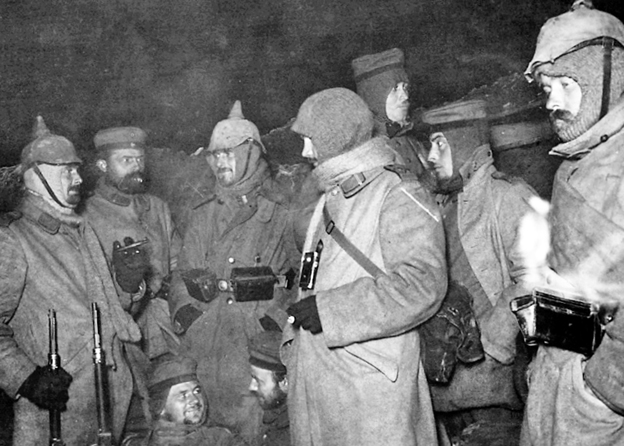 The press is turning the 1914 Christmas Truce into a harmless display of "humanity in the midst of barbarity", to the point where Sainsbury's can turn it into an advert for chocolate. But behind the Christmas Truce lay a real revolutionary potential...
The press is turning the 1914 Christmas Truce into a harmless display of "humanity in the midst of barbarity", to the point where Sainsbury's can turn it into an advert for chocolate. But behind the Christmas Truce lay a real revolutionary potential...